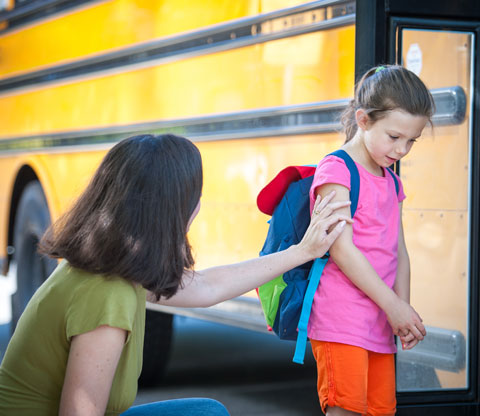At IEL, we have updated our language to reflect our continued understanding of disability. This uses the term “special needs,” but the content remains relevant.
Spring is the time of year when we think of changes.
A new season brings green grass, flowers, and for children who are 5 or turning 5, the end of preschool and beginning plans for kindergarten. How can parents prepare for this new milestone? The Illinois Early Learning Project’s six tips on Starting Kindergarten apply to all families. They are:
- Talk about the kindergarten program before the first day of school
- Visit the kindergarten classroom in the spring
- Let your child know it’s OK to feel anxious
- Be sure your child is well rested and well fed
- Help your child develop a sense of responsibility
- Take kindergarten seriously.
If your child has special needs, additional preparation may include:
Ask the district coordinator or designated kindergarten staff to meet with you and your child’s preschool teacher and therapists.
This meeting can help everyone plan for the new year and review your child’s IEP (individualized education plan). Important questions to discuss include:
- What do recent assessments of your child show in terms of kindergarten readiness?
- What supports (e.g., teacher’s aide, communication board) will my child need to fully participate in kindergarten? Who will provide these supports so my child becomes a member of the kindergarten community?
- How can the kindergarten staff build upon the IEP and services provided in preschool to avoid disruptions in learning?
- What options are available at the kindergarten level and which options will best meet my child’s needs?
- How can I (or other family members) be involved in planning for the change from preschool to kindergarten?
Develop a plan to prepare your child and family for school change.
Your plan may include:
- Working toward having regular routines at home, such as planning a daily toy cleanup time.
- Teaching self-help skills expected in kindergarten, such as how to use a zipper or Velcro closures for jackets or shoes.
- Exploring the kindergarten classrooms, hallways, and playground when most students are away. This provides an opportunity to talk about saying goodbye to preschool and hello to kindergarten.
- Helping your child make a photo album or picture book of what he likes most about preschool, the important learning goals he has met, and any special skills or talents he has gained. This book helps preserve good memories and is a way to share information about your child with the new school.
Recognize that your child will change teachers and classrooms frequently over the next 12 years of schooling and that this is the first big change.
If you are anxious, talk with parents of children who have moved from kindergarten to first grade or request a time to talk with a kindergarten teacher. Find out what ways are best to communicate with the teacher and staff when your child starts school. Will it be through home-school notebooks, e-mail, phone calls, or regular meetings? The more you know about the kindergarten experience, the more comfortable and better prepared you are likely to be to encourage your child in taking this next big step.

Susan Fowler
Dr. Susan Fowler is a retired professor of special education at the University of Illinois. Susan’s doctorate was in developmental and child psychology and she was one of the pioneers in early childhood special education and developmental disabilities. She also is a parent of a young man with exceptionalities.
Biography current as of 2022


